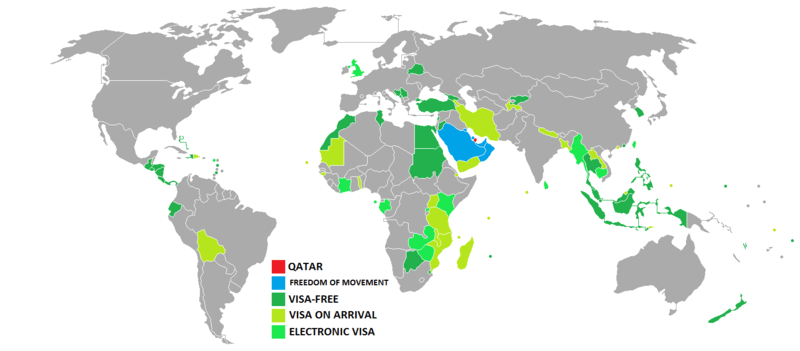Qatari nationality law
Qatari nationality law is based mostly on jus sanguinis. Unlike some other Gulf states, Qatar officially allows non-Muslims to apply for citizenship. Because Qatar is part of the GCC, members from other GCC nations can stay in Qatar without restrictions and vice versa.
By Birth
Children born in Qatar to unknown parents are Qatari citizens by birth.[1]
By Descent
Children born to a Qatari father irrespective of their place of birth are Qatari citizens by descent.[2]
By Naturalization
Foreigners may be granted citizenship if they fulfill the following:[3]
- legally resided in Qatar for 25 years with gaps not exceeding 6 months. 15 years if the person is an Arab citizen.
- is of good character and has a clean criminal record.
- has legal ways of earning a living.
- has enough knowledge of the Arabic language.
- People with Qatari mothers are given priority.
Even though Qatari law allows naturalization of foreigners, Qatar rarely grants them citizenship even if they have a Qatari mother.[4]
Recently, Qatar has offered a quick citizenship process for citizens of GCC member state, Bahrain.[5]
Dual citizenship
Qatar does not recognize dual citizenship. Holding another citizenship may lead to the revoking of Qatari citizenship.[6]
Loss of Qatari citizenship
The person may lose Qatari citizenship in the following cases:
- The person joins the military service of a foreign country.
- The person works for a foreign government that is in war with Qatar.
- The person takes up a foreign nationality.
Citizens are allowed to voluntarily give up Qatari citizenship.[1] Qatari citizens can also have their nationality revoked if they speak out against the government or state.
Travel freedom

In 2016, Qatari citizens had visa-free or visa on arrival access to 79 countries and territories, ranking the Qatari passport 60th in the world according to the Visa Restrictions Index.
References
- 1 2 "Qatari citizenship". Retrieved 21 Feb 2015.
- ↑ "Law No. 38 of 2005 on the acquisition of Qatari nationality". Al Meezan. Retrieved 21 Feb 2015.
- ↑ "Qatar's citizenship law to benefit Indians". Times of India. Retrieved 21 Feb 2015.
- ↑ "How to get a Qatari citizenship? Not even if your mother were a Qatari, but play a sport and you stand a chance". Just Here. nofe al-suwaidi. Retrieved 21 Feb 2015.
- ↑ http://in.reuters.com/article/2014/08/07/bahrain-qatar-naturalisation-idINL6N0QD4Q320140807
- ↑ "Dual citizenship 'is not allowed under Qatari law'". Gulf news.com. Retrieved 21 Feb 2015.